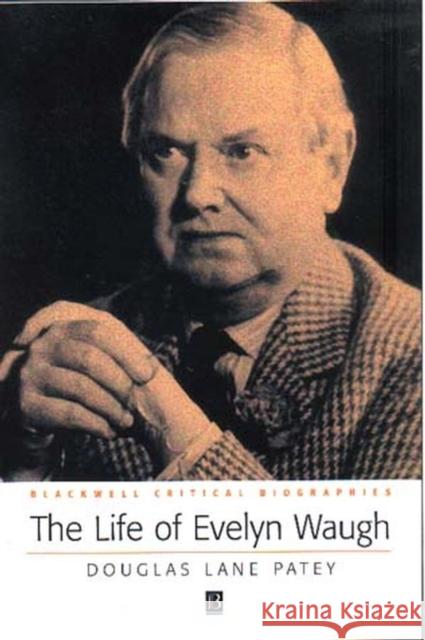Life Evelyn Waugh » książka



(netto: 215,79 VAT: 5%)
Najniższa cena z 30 dni: 223,82
ok. 30 dni roboczych.
Darmowa dostawa!
He has written a masterful biography, rich in enlivened critical detail, which more than any other study of Waugh to date, works to redress the bias against its subject that is so representative of Stannard's major two-volume account.
Wydanie ilustrowane
"Patey mounts a spirited defence of Waugh, dismissing with some authority many of the familiar items on the charge–sheet. Patey seems to have read not only everything his subject wrote, but a great deal of background material. Such thoroughness, and an alertness to what may be going on in Waugh′s apparently limpid prose makes it a valuable addition to a growing body of critical work on this twentieth–century master."
Times Literary Supplement
"This calm, deliberate biography– which measures Waugh′s life in the context of his work, rather than making the work serve as an excuse for discussing the life – should be included in every academic collection for use of undergraduates through faculty" Choice
"Patey′s sympathetic and acute portrait of Waugh narrates Waugh′s narration of his own life, combining thorough research with an exhaustive knowledge of Waugh′s fiction and nonfiction and the insight of a highly skilled literary critic. The result is the finest biography by far of Evelyn Waugh to date, and a welcome corrective of the regnant record. It is impossible to pay sufficient tribute to the chapter Patey devotes to Brideshead Revisited. It is, simply, the very best interpretation of the novel of which I am aware." First Things
The Life of Evelyn Waugh is a biography with a difference. In addition to being the life story of the English writer who was so active from the late 1920s until his relatively early death in April 1966 at age 62, it is also a critical assessment of his novels and other literary works. Readers will be well repaid for their perseverance." Languages and Literature
"It is a tribute to the thoroughness of Patey′s research and his ready invocation of so many perspectives that the subject of his biography should emerge as an even more fascinating and complex figure than one had imagined. It is Waugh the writer, though, who must remain of prime interest. In this regard, Patey is the perfect critical guide." The Month
"Patey is a crisp and detailed writer who pays Waugh and the reader the greatest tribute of all–he stays out of the way and gets on with the story" Arthur Jones
"A remarkably insightful and readable account of Evelyn Waugh, the writer and the man. While taking the full measure of Waugh′s comic genius, Douglas Patey brilliantly analyzes Waugh′s sacramental imagination about the world – the writer′s conviction, explored through a variety of fictional and journalistic forms, that the extraordinary and transcendent lie just on the far side of the ordinary. Indispensable for anyone who wants to get inside the mind and soul of one of the great English authors of our time." George Weigel
"This is surely the finest biography of Evelyn Waugh yet written. It is unashamedly a literary biography and concentrates on the published work, though never forgetting the personal context in which these were written. Within its pages there is much valuable information, some of it of a kind that brings out the essential spirituality of Evelyn Waugh." Culture Wars
"Patey has provided the layman and the devotee alike with an indispensable guide to the writer and the vagaries of hs century. I suspect The Life of Evelyn Waugh will be a well–thumber reference tool for many years to come." Evelyn Waugh Newsletter and Studies
Chronology of Waugh′s Works.
List of Illustrations.
List of Abbreviations.
Preface.
1. Becoming Modern (1903–1930).
2. The Doom of Youth: Decline and Fall and Vile Bodies.
3. Political Decade – I (1930–1935).
4. Political Decade – II (1935–1939).
5. A Peoples War (1939–1945).
6. Brideshead Revisited.
7. A Peoples Peace (1945–50).
8. The Post of Honour is a Private Station (1948–1953).
9. Retrospective: Shaping a Life (1953–66).
Notes.
Bibliography.
Index.
Douglas Lane Patey is Professor of English at Smith College, Northampton, Massachusetts. His previous books include Probability and Literary Form: Philosophic Theory and Literary Practice in the Augustan Age (1984). He is the author of numerous essays on eighteenth–century and philosophical subjects.
In this lively and just account, Douglas Patey follows Evelyn Waugh′s career from the comfortable middle–class home he was anxious to flee, through his escapades at Oxford, his adventures in South America and Africa, his experience of war, to his last years as veiled autobiographer. In the process the author explores the nature of Waugh′s Catholicism and examines how his religious beliefs began to guide his novelistic practice.
Arguing that Waugh′s novels, like his travel writing and even his biographies, are consistently autobiographical, Patey draws out the connections between the life and work, through a series of compelling chapters. At the centre of his account is the view that Waugh′s novels contain detailed spiritual and artistic self–analysis, usually in the form of rejection and atonement.
Patey has written a masterful biography, rich in enlivened critical detail. More than any other study of Waugh to date, his book works to redress the bias against its subject that is so representative of Stannards major two–volume study.
1997-2026 DolnySlask.com Agencja Internetowa
KrainaKsiazek.PL - Księgarnia Internetowa









